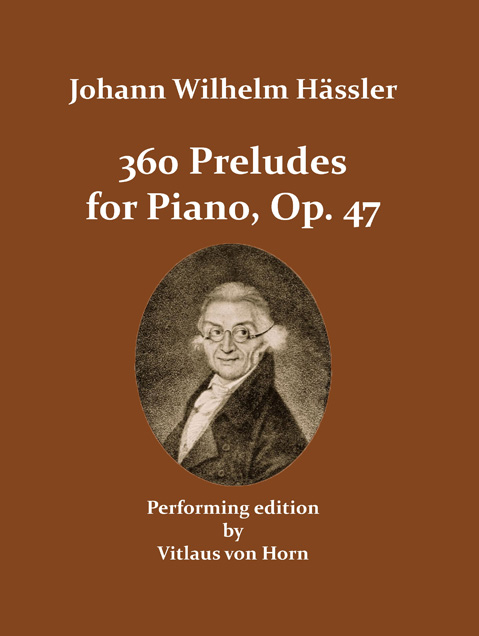Johann Wilhelm Hässler: 360 Preludes for Piano, Op. 47 (1817)

360 Preludes for Piano, Op. 47 (1817) (ISBN 9781387117345)
The 360 Preludes for Piano, Op. 47 of Johann Wilhelm Hässler (1747–1822), is an astonishing work, and among his best compositions. I produced this volume, containing the entire Op. 47, in collaboration with the pianist Vitlaus von Horn, who has recorded the entire work (along with a few others) on the Grand Piano label (GP686-987). This performing edition is the first modern edition of the 360 Preludes, 200 years after its publication in Moscow, and its appearance was timed to correspond with the release of Mr. von Horn's complete recording.
Ranging from non-discrete chord progressions (really nothing more than a student's harmony homework) to fleeting masterpieces prescient of Schumann (the shortest of the preludes was timed 3.4 seconds!), interspersed with Haydnesque humor, the preludes are nothing less than the creation of a genius, albeit of a very peculiar type. Hässler intended the preludes to fulfill primarily a pedagogical task—giving his students a body of music for study, enjoyment, and—most importantly in his view!—transposition. Even though the cycle is a true “cycle,” rather than a mere collection of unrelated pieces (as proven by the “arch construction” of the work, where preludes in the middle are much more involved than the preludes at bookends), the individual preludes, especially from the middle, are well suited for individual performance. Another way of performance, sure to delight any audience, is to play them in groups of 15, a key or two at a time.
Johann Wilhelm Hässler Biography
Johann Wilhelm Hässler was born in Erfurt, Germany in 1747. He studied under Johann Christian Kittel, one of J.S. Bach's last students. After holding an organist post in Erfurt from 1762 to 1769, he made concert tours as a virtuoso pianist and organist in Germany, and eventually throughout Europe until 1790. In 1789 he entered an organ competition with Mozart in Dresden (Mozart won). He spent 1790 to 1792 in London, moved to Saint Petersburg, and finally settled in Moscow in 1794, where he worked as a music teacher and composer until his death in 1822. As Mr. von Horn points out, his arrival in Moscow may have been something of a “born again” experience for him, because his work there begin with Op. 1, for a second time (perhaps he recycled some of his early works for the new Russian market).